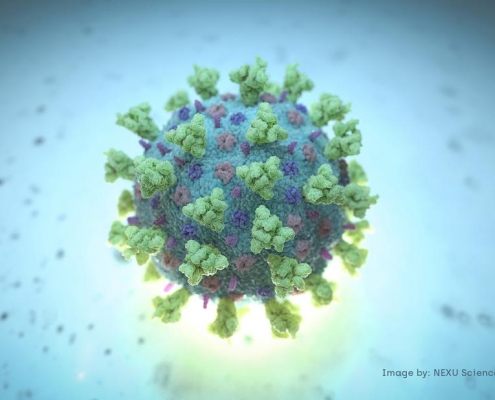AstraZeneca antibody cocktail fails to prevent Covid-19 symptoms in large trial
Astra antibody cocktail fails to prevent COVID-19 symptoms in large trial
June 15, 2021, 7:56 AM EDT; Updated 10:56 AM EDT
(Reuters; Vishwadha Chander, Ludwig Burger)
June 15 (Reuters) – AstraZeneca (AZN.L) said on Tuesday a late-stage trial failed to provide evidence that its COVID-19 antibody therapy protected people who had contact with an infected person from the disease, a small setback in its efforts to find alternatives to vaccines.
The study assessed whether the therapy, a cocktail of two types of antibodies, could prevent adults who had been exposed to the virus in the past eight days from developing COVID-19 symptoms.
The therapy, AZD7442, was 33% effective in reducing the risk of people developing symptoms compared with a placebo, but that result was not statistically significant — meaning it might have been due to chance and not the therapy.
The Phase III study, which has not been peer reviewed, included 1,121 participants in the United Kingdom and the United States. The vast majority, though not all, were free of the virus at the start of the trial.
Results for a subset of participants who were not infected to begin with was more encouraging but the primary analysis rested on results from all participants.

FILE PHOTO: A computer image created by Nexu Science Communication together with Trinity College in Dublin, shows a model structurally representative of a betacoronavirus which is the type of virus linked to COVID-19, better known as the coronavirus linked to the Wuhan outbreak, shared with Reuters on February 18, 2020. NEXU Science Communication/via REUTERS
“While this trial did not meet the primary endpoint against symptomatic illness, we are encouraged by the protection seen in the PCR negative participants following treatment with AZD7442,” AstraZeneca Executive Vice President Mene Pangalos said in a statement.
The company is banking on further studies to revive the product’s fortunes. Five more trials are ongoing, testing the antibody cocktail as treatment or in prevention.
The next one will likely be from a larger trial testing the product in people with a weakened immune system due to cancer or an organ transplant, who may not benefit from a vaccine.
TARGETED ALTERNATIVES
AZD7442 belongs to a class of drugs called monoclonal antibodies which mimic natural antibodies produced by the body to fight off infections.
Similar therapies developed by rivals Regeneron (REGN.O) and Eli Lilly (LLY.N) have been approved by U.S. regulators for treating unhospitalised COVID patients.
European regulators have also authorised Regeneron’s therapy and are reviewing those developed by partners GlaxoSmithKline (GSK.L) and Vir Biotechnology (VIR.O) as well as by Lilly and Celltrion (068270.KS).
Regeneron is also seeking U.S. authorisation for its therapy as a preventative treatment.
But the AstraZeneca results are a small blow for the drug industry as it tries to find more targeted alternatives to COVID-19 inoculations, particularly for people who may not be able to get vaccinated or those who may have an inadequate response to inoculations.
The Anglo-Swedish drugmaker, which has faced a rollercoaster of challenges with the rollout of its COVID-19 vaccine, is also developing new treatments and repurposing existing drugs to fight the virus.
AstraZeneca also said on Tuesday it was in talks with the U.S. government on “next steps” regarding a $205 million deal to supply up to 500,000 doses of AZD7442. Swiss manufacturer Lonza (LONN.S) was contracted to produce AZD7442.
Shares in the company were largely unchanged on the London Stock Exchange.
The full results will be submitted for publication in a peer-reviewed medical journal, the company said.
Our Standards: The Thomson Reuters Trust Principles.
Reuters source:


